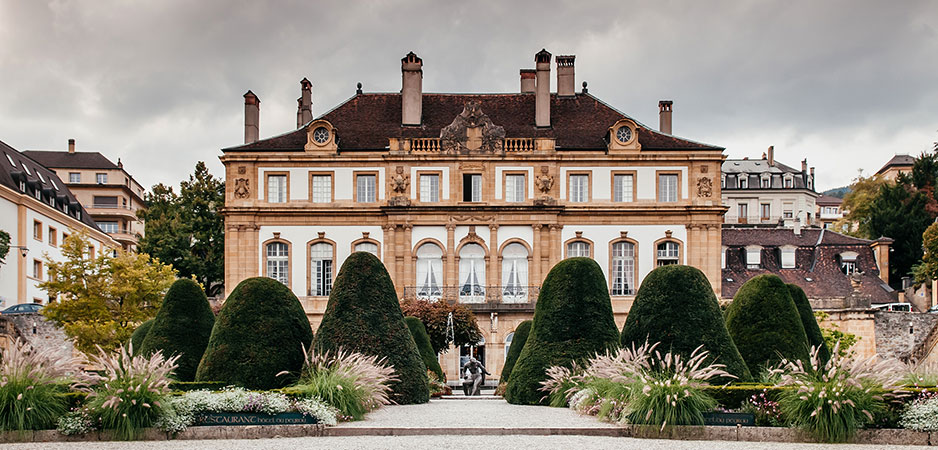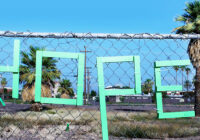In a country rich in peculiarities, the Swiss city of Neuchâtel is a particular oddity. Today, Neuchâtel is the capital city of the eponymous canton, located in Romandy — the French-speaking region of Switzerland. This in itself is quite odd, given the fact that since the early 18th century, Neuchâtel belonged to Prussia. The city’s old town still pays tribute to this heritage. Its architecture evokes images of Potsdam, Prussia’s garrison town outside Berlin.
In 1815, Neuchâtel joined the Swiss confederation, yet still retained its ties to Prussia. It was only in the revolutionary year of 1848 that the city gained its independence from Prussia. Today, the city is known for its university and its football club, which plays in Switzerland’s top league — with moderate success. Otherwise it is little more than a provincial town along the train tracks that connect Geneva with Zurich.
What’s in a Name? Rebranding Racist Legacies
And yet. At one point in its history, Neuchâtel played an important role in the trade in human beings between Africa and the New World. In fact, Neuchâtel’s “grand families,” whose sumptuous mansions still grace its cityscape, owed much of their wealth to the slave trade. Much of this history was largely unknown, until 2003. That year, a Protestant pastor delivered a sermon, diffused via Romandy radio, in which he castigated one of the city’s most illustrious historical figures and benefactors, Pierre Alexandre Du Peyrou (1729-1794), for his role in the exploitation of slave labor on his plantations in Surinam. Ironically enough, De Peyrou was close to Rousseau and Voltaire.
The 1.5%
The sermon caused a scandal and provoked vigorous protests, causing the city’s Protestant authorities to distance themselves from its author. By then, however, the genie was out of the bottle. Following an interpellation in parliament, the Swiss government acknowledges the role of Swiss nationals in the slave trade, but cautions that Switzerland was not a “colonial power and therefore not implicated in the slave trade.” In other words, it was private citizens, not the confederation that was involved in slavery.
In the years that followed, Swiss historians embarked on an investigation of Switzerland’s role in the slave trade. They reconstructed the triangular trade, which started with Swiss fabrics, weapons and alcohol shipped to West Africa. There the ships took on slaves to be sent across the Atlantic and exchanged for coffee, cotton and other colonial wares. The trade was risky but highly lucrative. One of its profiteers, David de Pury, from Neuchâtel, amassed a huge fortune, worth some 700 million Swiss francs in today’s money, which he left in its entirety to his native city.
The funds were used to turn Neuchâtel into one of the most picturesque cities in the country. To honor the great benefactor (this is how Wikipedia characterizes him), the city names its main square after him and erects a bronze statue. A few days ago, a collective of activists launched a petition demanding the removal of the statue.
In 2005, researchers from the University of Lausanne concluded that Swiss citizens were involved in 1.5% of financing the transfer of some 11 million slaves to the New World. And it was hardly only those good citizens of Neuchâtel who profited from the slave trade. Citizens from other cantons, such as Vaud and Basel, also sought to make their fortunes at the expense of human misery. One of Basel’s major firms went as far as to purchase a ship designed for the slave trade. The venture ended in disaster, resulting in the death of two-thirds of its human cargo. To be sure, 1.5% might seem rather negligible given the extent of the slave trade. Yet in Switzerland, it has caused significant soul searching. As an article from 2004 put it, “They were Swiss, but also Slavers.”
And Yet
Today, the Swiss role in the slave trade is largely recognized, documented and acknowledged. A foundation, Cooperaxion, maintains an extensive databank that documents the activities of Swiss actors involved in the slave trade between the 17th and 19th centuries. In Neuchâtel, the city’s museum devotes a large section to the city’s role in the promotion and perpetuation of slavery. Private citizens offer walking tours devoted to the memory of the city’s role in the slave trade.
And yet. Like most countries in Western Europe, Switzerland has had a hard time coming to terms with its history. This is particularly true with respect to its role during the Second World War. The country was in a rather delicate position — neutral, surrounded by hostile powers. Yet it was Switzerland that asked the Germans to stamp a “J” onto German-Jewish passports, making it easier for Swiss border guards to refuse entrance to German Jews. Until today, Switzerland’s leading party, the Swiss People’s Party, insists on the country’s “honorable,” if not heroic, role during the Second World War.
In comparison, Switzerland’s confrontation with its less than honorable role in sustaining, if not promoting, the slave trade and slavery in general is exemplary. At the same time, however, Switzerland has done nothing in terms of what in German is called Wiedergutmachung — literally, making things good again, or compensation. Here, of course, Switzerland is hardly alone. Wiedergutmachung does not necessarily mean only monetary compensation. It also means removing what offends, such as statues of national “heroes” whose deeds proved anything but heroic — from the imperialists in the UK to Confederate generals in the US to petty slavers in Switzerland. Both types of Wiedergutmachung have proven more than difficult, even in exemplary cases, such as Germany.
In Switzerland, recognition and acknowledgment of past misdeeds does not necessarily seem to have increased a sense of sensibility in the country. In Rolle, a small town between Geneva and Lausanne, the town’s main hotel is still called La Tête Noire — the black head. The German equivalent would be Mohrenkopf — the Moor’s head, the name of a chocolate-coated confectionary very popular in Germany and Austria. In both countries, the name has disappeared many years ago, replaced with the neutral “chocolate kiss.”
Not so in Switzerland. Until recently, one of the two major supermarket chains still offered the sweet under its original name, despite protests given its racist connotations. It was only in response to the current wave of antiracist protests that the chain decided to remove the product from its shelves. The producer, a small family enterprise, will continue to sell products under the traditional name. His argument: “The world is not going to be less racist if I change the name.” Sadly enough, he is probably right.
The views expressed in this article are the author’s own and do not necessarily reflect Fair Observer’s editorial policy.
Support Fair Observer
We rely on your support for our independence, diversity and quality.
For more than 10 years, Fair Observer has been free, fair and independent. No billionaire owns us, no advertisers control us. We are a reader-supported nonprofit. Unlike many other publications, we keep our content free for readers regardless of where they live or whether they can afford to pay. We have no paywalls and no ads.
In the post-truth era of fake news, echo chambers and filter bubbles, we publish a plurality of perspectives from around the world. Anyone can publish with us, but everyone goes through a rigorous editorial process. So, you get fact-checked, well-reasoned content instead of noise.
We publish 2,500+ voices from 90+ countries. We also conduct education and training programs
on subjects ranging from digital media and journalism to writing and critical thinking. This
doesn’t come cheap. Servers, editors, trainers and web developers cost
money.
Please consider supporting us on a regular basis as a recurring donor or a
sustaining member.
Will you support FO’s journalism?
We rely on your support for our independence, diversity and quality.






